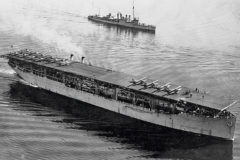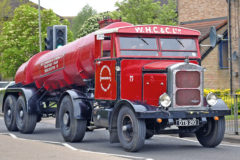1936 Fowler DNC road roller
Posted by Chris Graham on 10th August 2022
Jonathan Vartan talks to David Vaughan about his life with steam engines and, in particular, his 1936 Fowler DNC road roller Hermes.
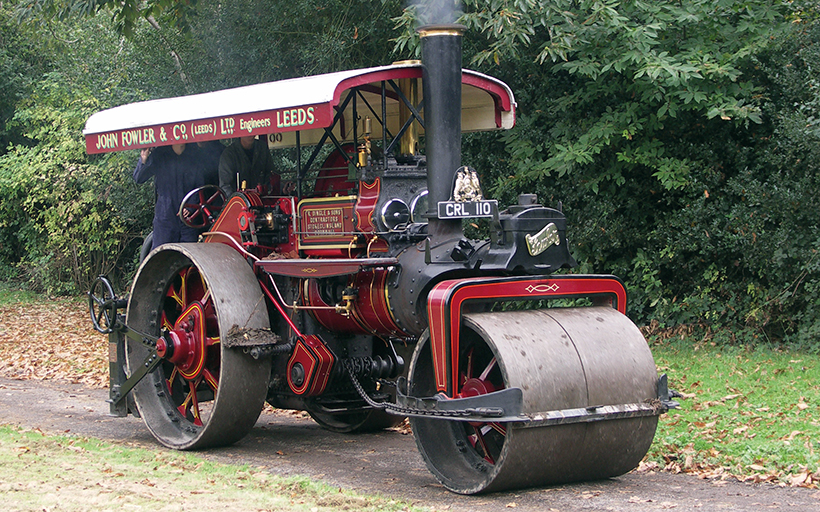
1936 Fowler DNC road roller: Jonathan is always keen to promote our steam heritage to the next generation of custodians, and is seen here with Hermes taking part in the NTET’s Southern Branch Steam Apprentice Day held at Tinkers Park in September, 2011.
I first met Jonathan Vartan at a local rally where I was a commentator and rally marshal. He had not long been the owner of Hermes, Fowler DNC 4nhp compound road roller No. 21833 built in 1936, and I was pleased to note that the engine was in fine order.
I met up with Jonathan at the New Inn at Hadlow Down, often the haunt of Sussex engine owners, and we soon fell into conversation reminiscing about his years with Hermes on the rally circuit. I knew a bit about the Fowler’s history but I was keen to learn more, so I started by asking Jonathan how and when he first acquired it.
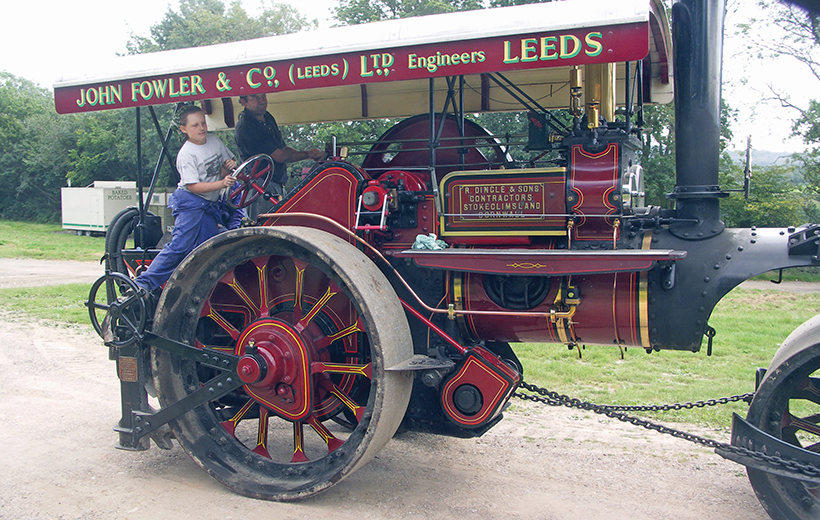
A young steam apprentice gets a lesson from Jonathan on how to steer around the roads at Tinkers Park.
JV In 1982 Goff Radcliff was selling off part of his extensive collection of steam engines and fairground rides. (Goff is a well respected local preservationist and is, to this day, still involved in the movement). I went along with a friend to see what was on offer. Such mighty engines as City of Hull and showman’s engine Sir John Fowler were beyond my means, but I had some compensation from a rather nasty motorcycle accident and this enabled me to make an offer for Hermes which Goff accepted.
Anyway, prior to this it was owned by Spencer Green of Bristol who worked in the aviation industry. He had carried out a fair amount of work on the engine that was well done and from which I am still benefiting; for instance I have never had to touch the valve rods. Originally it was owned by the well-known Cornish contractor Dingles. They had bought it from Fowlers after it had, as I understand, been a demonstrator for them in Magdeburg, Germany. Having been returned to Fowlers unsold it presented a good deal for Dingles who owned and operated the engine until the late 1950s. I got a good 15 years of rallying out of it before it was obvious that major work to the firebox, boiler, smokebox and tube plate was needed. I sent it to an engineer in Kent but when it came back I am afraid to say it was more worthy of a water feature than a steam engine as it leaked like a sieve!
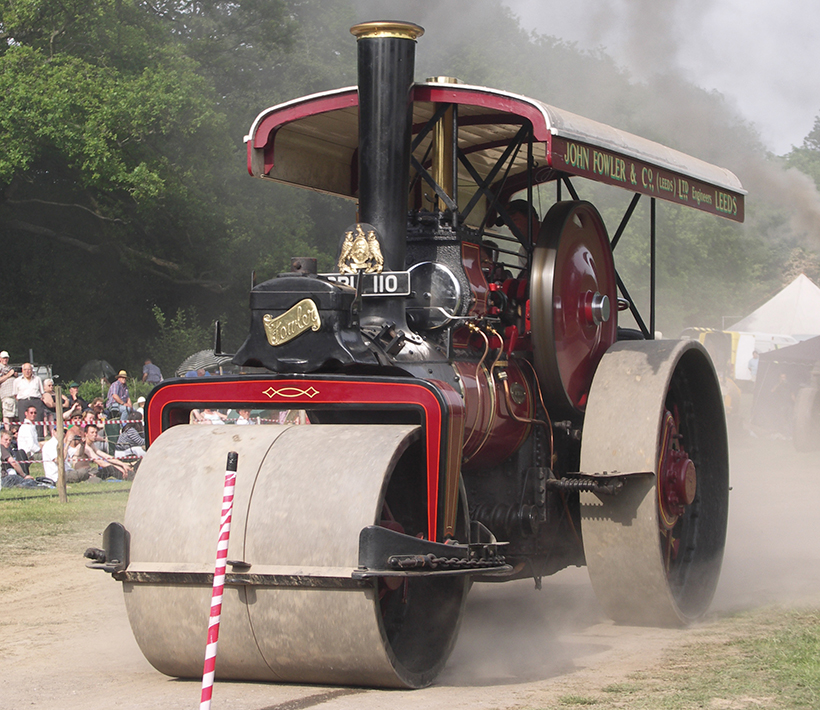
A popular arena event at Tinkers Park rallies is the ‘Width of Engine’ competition. Here we see Hermes kicking up the dust in June 2014. The idea is for the steersman to look out from the engine at one end of the arena to a set of poles at the other end, and judge the width between the poles. From the engine he or she directs the ‘Polemaster’ to place the poles appropriately and then, at a given signal, the driver sets out to make the fastest time across the arena, stopping with the rear wheels between the poles without knocking them over. The width between the rear wheels and the poles is measured and the total, in inches, plus the time taken for the run down the arena, is added to together and the winner is the crew who achieved the fastest time without hitting the poles!
DV So you were not best pleased then.
JV Yes, that would be the kindest thing to say!
DV What did you do then?
JV I took it to local engineer Alex Hume’s yard. He had been too busy at the time I originally wanted it done, anyway between us we sorted it out, but it took a fair amount of welding and a lot of caulking before all the leaks were rectified.
DV I remember that, after you had put the engine back together again, I suggested to a local vehicle preservation society that it should be judged as part of an award scheme that I had helped to set up. The scheme was designed to reward people for work done on a recent restoration project. As part of that you had to come down to Eastbourne and give a presentation on the engine and explain what work had been carried out. You deservedly went on to win your class.
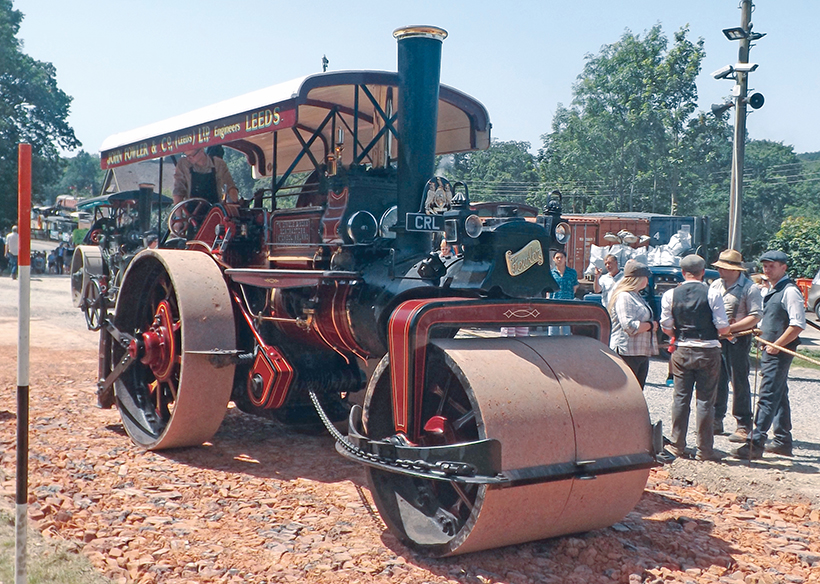
Doing what it was designed for. Hermes is putting its weight into rolling hardcore for a road-making demonstration at Horsted Keynes on the Bluebell Railway’s ‘Road Meets Rail’ weekend in 2021.
JV Yes I remember feeling a bit guilty as I had not done much of the work myself being as I was self-employed and with family responsibilities. In fact Peter Fagg of the British Engineerium put it all back together.
DV Preservation of any old vehicle or machine is a risky business and, like all life, subject to highs and lows. I seem to recall that on the way to an event in Kent you had an argument with a rock or a gate post.
JV Yes, we were on the way to Rochester aerodrome for a rally and just caught the chain carrier on a roadside stone bank, It pushed the head pin forward and cracked the headstock but fortunately the roller did not go down on its knees. We managed to get it into a nearby farmyard where we affected a temporary repair with a couple of pieces of channel sandwiched either side and a bit of welding and we managed to get it to the rally and back home like that.
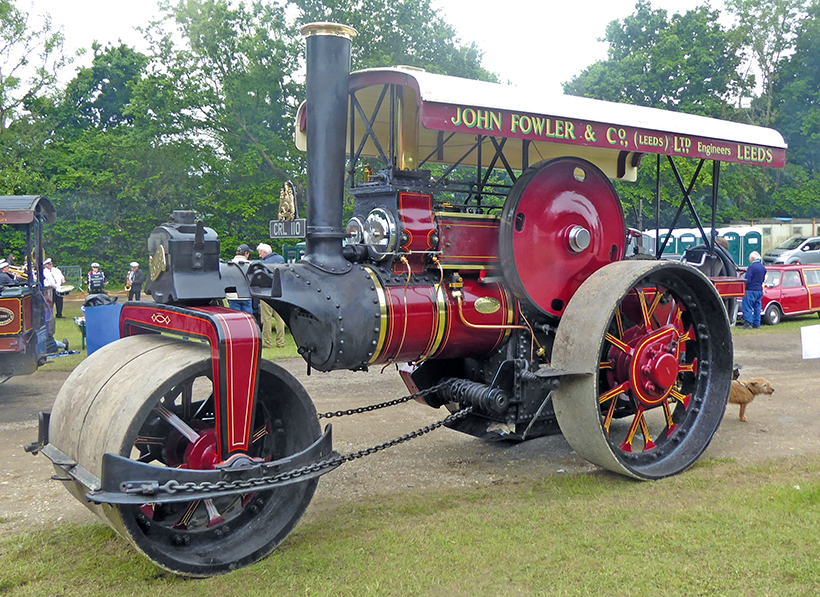
At the end of an enjoyable day at Tinkers Park Jonathan and the two Ollies have gone for a drink and some grub, leaving Jonathan’s faithful terrier Fred in charge of the engine!
Another time I remember we were going from Rushmoor to Gillingham going down Gravel Hill near New Addington when the engine got away from us for a few hundred yards. We managed to keep it on the road but we split a tyre on the caravan when it hit the kerb. That was a bit hairy but thankfully we got it under control before it got serious.
DV Back in the day there were lots more arena events involving steam engines but, like it or not, health and safety regulations and the reluctance of rally organisers to put anything on that might result in being sued by a member of the public have largely put a stop to this.
JV The steam and diesel rally at Rochester that used to be on the August bank holiday weekend was always a bit of fun. I remember one time with myself and John Naylor’s engine, together with a Scammell Pioneer we were pulling this old banger apart in the ring with some chains round it. So we three formed a triangle. The steam engines slowly moved away in two opposite directions and this had the effect of making the Scammell stand up on its hind wheels! Of course with the swinging arm rear suspension it could do this but it looked quite spectacular!
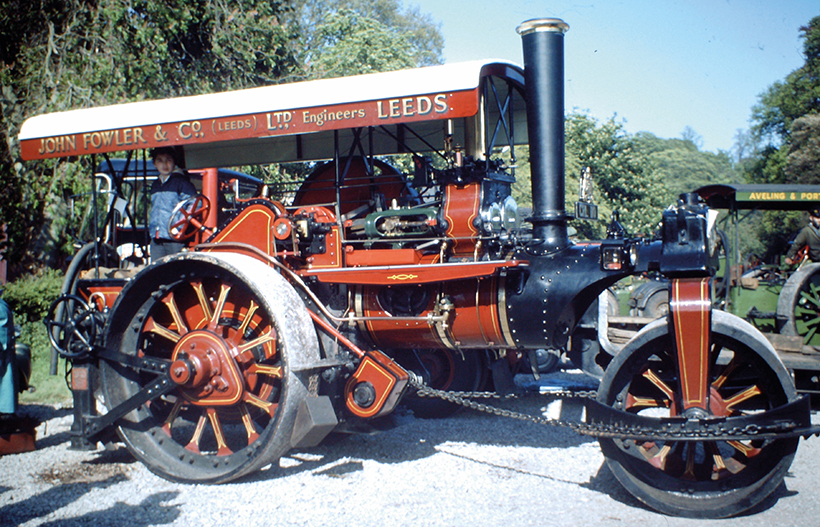
Seen on 15 May, 1976, at Didington looking very smart. (Pic: Bob Moorman)
DV I think you always take the engine to events on the road, sometimes on quite long journeys.
JV Yes, I think it’s true to say I enjoy taking the engine to an event on the road more than just standing on a rally field. I especially remember some of the night runs when the roads were clear and you were by yourself. I remember stopping for water at about 1.30am and a chap came out of a house with coffee and cake. One early morning near Aldershot on the way to Rushmoor a lady came out to see us and we said we were looking for a café. There were a couple not far away but, at that time of day they were closed so she went back in and came out with tea, toast and yoghurt, almost a full breakfast! It’s the little things like that you remember rather than the setbacks.
DV You must have seen quite a few changes over the years.

We see the other side of No. 21833 on 15 May 1976 at Didington. (Pic: Bob Moorman)
JV Well I started out many years ago, I think in about 1968,with the Pages of Chiddingly who were helping out Alan Morris. He had bought the pair of ploughing engines Tweedle Dee and Tweedle Dum from Bill McAlpine and they were borrowed by James Lowther to dredge a lake at Earlswood whilst his own engines, Windsor and Sandringham, were having some work done on them.
DV In the well known film The Moon And The Sledgehammer you were to be seen sitting in the tender of one of the pair whilst on the way back to Page’s yard.
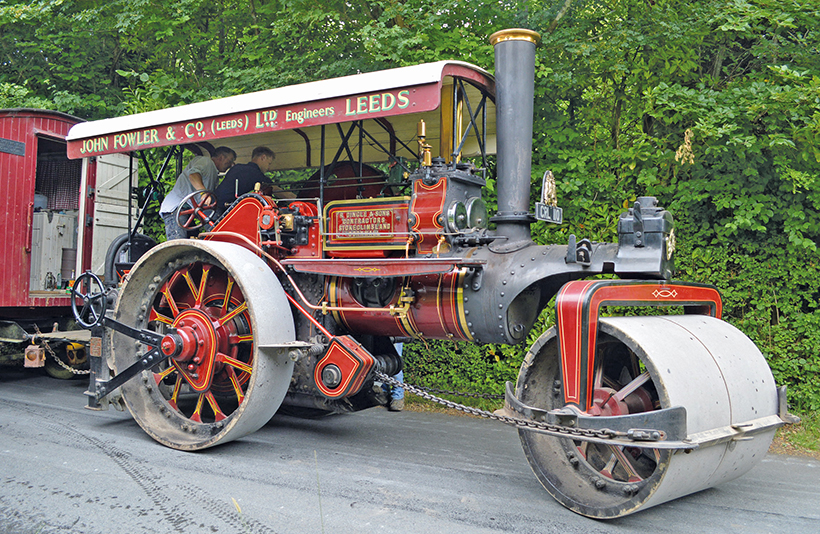
Going like a train at the Blackboys Inn on 9 June 2018. (Pic: Bob Moorman)
JV Yes, that’s right. It was Peter, Ron and Jim Page who taught me how to work with steam engines. Ron had the big Marshall Ben Lomond and Peter had the lovely old Allchin Lena. I helped Peter Page put the tubes in one of the ploughing engines, working the forge and sitting in the long smokebox while Peter wound the tubes in. It took days. Nowadays you can get a torque machine that makes the job a lot easier.
DV You went on to work with James Lowther on Windsor and Sandringham.
JV Yes I did. I used to bunk off school early on Friday and cycle over to Earlswood lakes and my dad would come and pick me up on Sunday night. This was in the days before mobile phones so you had to make plans and stick by them.

Hermes at the Blackboys Inn on 9 June 2018 at the Sussex Steam Engine Club’s 25th anniversary event. (Pic: Bob Moorman)
DV I understand from interviews I have done with people who worked with him that the late Mr Lowther could be difficult to work for.
JV Yes, he could be an angry man and I got fired twice! He got banned from a pub once after an argument with the landlady and said to the crew, “Our custom is no longer welcome here!” I looked at the digger driver and we said “Well we don’t have a problem,” so we went back in!
Despite all that, I learned a lot from him, and we had some good fun at times.
DV I suppose it was interesting working with the two big AA class Fowlers in a challenging environment that kept your interest.
JV Yes that’s about it. I remember one job in Yorkshire. We were dredging a lake at Settrington for Sir John Story and we were buzzed by an A3 tankbuster aircraft from a local air base who were using us as target practice, Luckily they were just taking pictures and I suppose we were sort of tank size!
DV The major effects of the pandemic are behind us, but the public are now also faced with increased costs of fuel, housing and food so this may affect attendances at rallies. How do you see the future of working steam events?
JV It rather depends on how long the financial current climate takes to settle down, but the whole future of steam heritage events as we know them was already under threat before the pandemic. One of the worst things is the threat of losing a supply of steam coal from the last deep coal mine in Wales. This means we shall have to use these new compressed coal ovoids, or poorer quality coal from overseas. We really will have to fight to keep what we have if future generations are to enjoy it.
DV I know that you yourself have been suffering from health problems that restrict movement to some extent, but you are not letting that keep you off the engine
JV Yes but I have been lucky to have had the help of ‘The Two Ollies’ as I call them, Ollie Warburton and Ollie Mulliss. I have got my enthusiasm back and the engine is looking really smart. We spent time during the winter of 2020 on a few odd fettling jobs, including getting rid of an annoying big-end knock. In 2021 we arranged for a hydraulic test to be carried out and took the opportunity to fit ‘Cosy Wrap’ insulation as boiler lagging, This has a sort of tinfoil backing which is supposed to improve heat retention. After the subsequent boiler test I am pleased to say we now have a new 10-year ticket!
DV Well Jonathan, I have enjoyed going down memory lane with you and your dog, Fred is getting a bit impatient and, as that brings the story up to date. I think that is a cue to ask the barman for a refill!
This feature comes from the latest issue of Old Glory, and you can get a money-saving subscription to this magazine simply by clicking HERE



